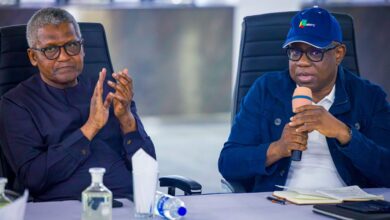The President of the Africa Oceans Council, Tsietsi Mokhele has said a phenomenon that Africa needs to awake to is the drop in the shipping connectivity index in Africa.
He made the statement while delivering his keynote address titled: “The State of the African Maritime” on 25th October 2024, during the African Shipowners Association (ASA) webinar that had Ship owners operating in the Africa domain, Association members, and other key stakeholders in attendance.
He emphasized that although African states have ports but they are not being connected by the average size of vessel that is out at sea due to size and pressures of productivity.
“We need to be aware that this might be one of the things that is discouraging improvement in the maritime sector. This has made Africa a price taker with no influence on the cost of its imports and exports.”he said.
Mokhele disclosed that Africa’s market trade has just been gifted the continental free trade volumes. He expressed unclarity about the gift going to Africa Shipping and Africa Maritime market, or others.
“The continental free trade has been a blessing on volumes that it will increase intra African trade by 28%. But for our market, the maritime trade market will increase the volume by 62% . We need to be ready to tap into the 62% or it will go to others.”
He noted that the effort to build shipping services will never take off and Africa will never succeed in the absence of maritime transport system.
“We need to work hard on the system and lay the system on top with the transportation services. Vessel ownership, operations and so on will not kupgrade until we have done a system of systems which in this context we are calling the trans-african seconded navigation of maritime transport system which simply sails coastal shipping along the continent.”
He opined that the way forward on building globally competitive African Maritime supply chain is forming collaborative networks of local, regional and international partners in both private and public sectors .
“To develop Africa’s major maritime transport corridors, the trans-African highways network must be integrated through Eastern coastal Shipping services, Western Coastal Shipping services, Intra-African Shortsea Shipping, Intra-Island Shortsea Shipping and development of seaports, harbours and Inland Dry ports.”
Dr. Gainmore Zanamwe, Acting Director, Trade Facilitation & Intra-African Trade Bank (IATF) said Afrexim bank has always been worried and concerned about the connectivity and cost of transportation and most importantly how to link the shipping industry to production.
He added that Africa needs an ecosystem that will be able to address all the issues in the value chain and that Afrexim Bank will provide financial support for Africa to own its vessels.
“Afrexim Bank has it as part of its strategic plan to prioritize the importance and need to invest not only investors but in ship building. We as Africans need to actually develop the capacity and skills to build our own vessels .I am fully aware of the challenge we have in terms of ownership of those vessels. We own less than 1% of those vessels.”
The Head of Trade in Services in the African Continental Free Trade Area (AfCFTA ) Secretariat, Beatrice Chaytor explained that creating maritime clusters can be a good way to foster innovations, skill development business partnership.
She maintained that African Maritime system has to focus on port infrastructure and connectivity.
“Many ports lack the capacity to handle larger vessels. They struggle with inefficient cargo handling. We have to improve Port infrastructure and connectivity to Inland transport networks to create that intermodal approach to the maritime ecosystem.”
The ASA Secretary General, Funmi Folorunsho mentioned that maritime sector is pivotal to Africa’s economic growth and integration into the global economy.She said African shipowners face a unique set of challenges that hinder their full potential, including regulatory issues, limited access to financing, infrastructure deficits, and competition from foreign shipping lines and these challenges need to be eliminated through collaborative effort from stakeholders to build a more robust and competitive maritime sector.












